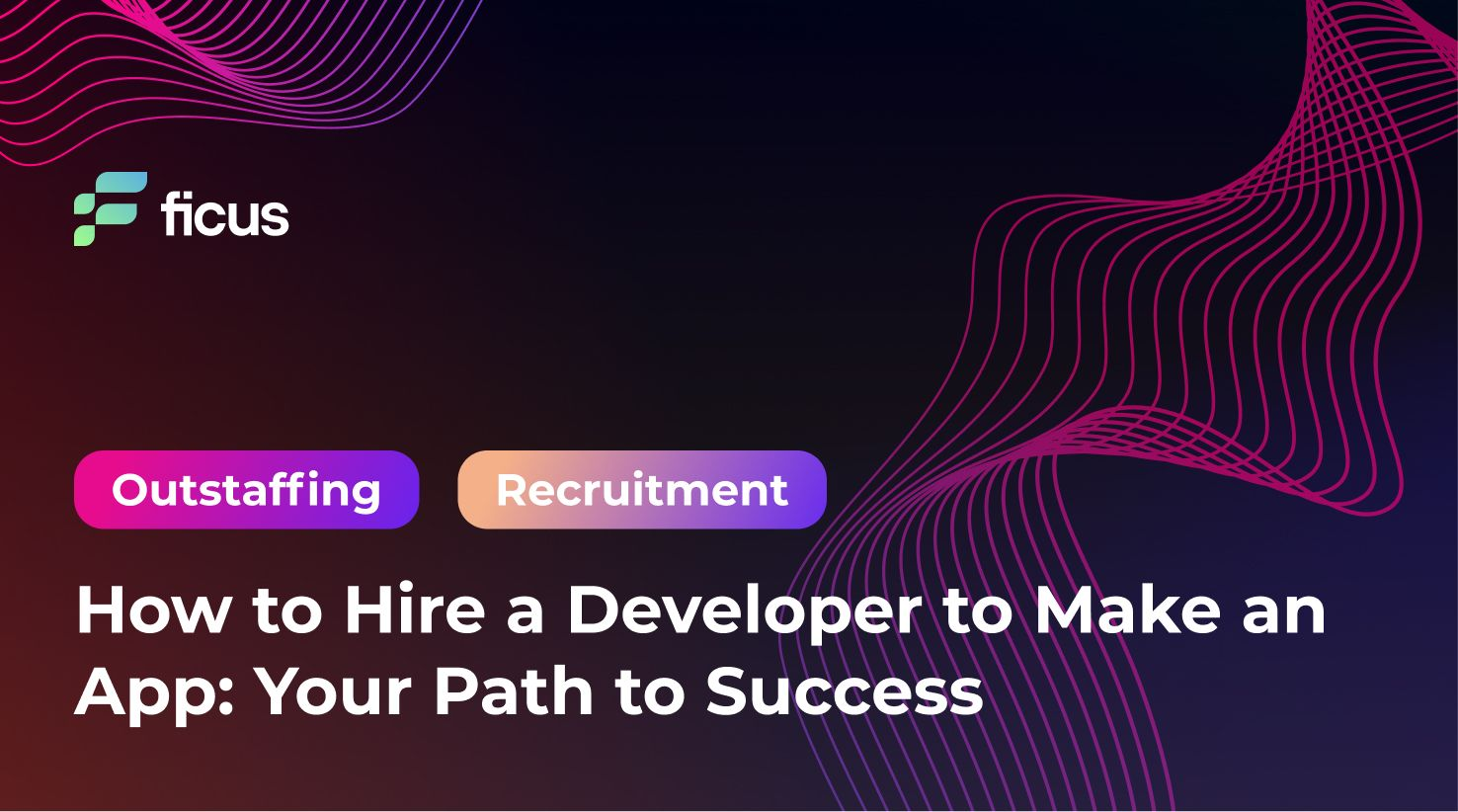Hiring a developer to make an app can be a transformative step for your business or project. In today’s digital age, having a mobile app can significantly enhance your reach and customer engagement. However, hiring a developer for your app can be daunting if you’re unfamiliar with it. That’s why we’ve created this comprehensive guide to walk you through every step, from why you should hire a developer to make an app, where to find one, how to choose the right developer for your app, cost considerations, and tips for successful collaboration. We’ll introduce you to our expert team at Ficus Technologies, who can make your app development journey successful.
- Hiring app developers offers expertise, time efficiency, quality, customization, and cost efficiency.<br>
- Find developers on freelance platforms, with development companies, through networking, or in online communities.
- Choose developers based on portfolio, experience, skillset, communication, and budget alignment.<br>
Why Opt for a Developer to Create Your App?
Before diving into the intricacies of hiring a developer for your app, let’s explore why you should consider this path. App creation professionals bring a wealth of knowledge and expertise to the table, making them invaluable for making your app idea a reality.
- Expertise: Developers have the technical know-how to bring your vision to life. They understand the ins and outs of mobile app development, ensuring your app is functional, user-friendly, and bug-free.
- Time-Efficiency: Hiring a developer saves you time. They can work on your project while you focus on other aspects of your business or project, allowing you to meet your goals more efficiently.
- Quality: A skilled developer ensures the quality of your app. They can implement best practices, incorporate the latest features, and provide ongoing support and updates to keep your app competitive.
- Customization: Developers can tailor your app to meet your specific requirements. Whether you need a mobile app for your business, a project, or a startup, a developer can provide a solution that fits your objectives.
A team of highly competent programmers who are also highly territorial, egotistical politicians will fail while a team of equally competent programmers, who are also egoless, cooperative, team players will succeed.
Daniel M. Berry
The Advantages of Enlisting a Developer
Now that you understand why hiring a developer is advantageous let’s delve deeper into the benefits you can expect when you hire a developer for your app:
- Experience: A developer brings a wealth of experience to the table. They have likely worked on various projects, gaining insights and expertise that can benefit your app’s development.
- Team Collaboration: When you hire a developer, you’re not just getting an individual; you’re gaining access to their entire team. This collaborative approach can result in a well-rounded and comprehensive app development process.
- Customization: Developers can create a tailored solution for your needs. Whether it’s an e-commerce app, a social networking platform, or a gaming app, a skilled developer can bring your vision to life.
- Ongoing Support: App development doesn’t end with the launch. Developers provide continuing support, ensuring your app remains updated, secure, and optimized for user experience.
- Cost-Efficiency: While hiring a developer comes with a cost, it can be more cost-effective than developing an app in-house, especially considering the time saved and the potential revenue generated by a well-developed app.
Where You Can Discover App Developers
Now that you’re convinced of the benefits of hiring a developer, the next step is to find the right one. Here are some avenues where you can start your search for app development professionals:
- Freelance Platforms: Websites like Upwork, Freelancer, and Toptal offer a vast pool of freelance developers. You can browse profiles, review portfolios, and hire developers based on your needs.
- Development Companies: App development companies, like Ficus Technologies, specialize in creating custom apps. They offer a group of knowledgeable project managers, designers, and developers to help you complete the development process.
- Networking: Attend industry events, join forums, and engage with your professional network to find referrals and recommendations for reputable developers.
- Online Communities: Websites like GitHub and Stack Overflow are hubs for developers. You can explore these platforms to identify developers with the skills and experience you require.
Selecting the Ideal Developer for Your Project
Selecting the ideal developer is a key choice that may greatly influence your project’s success. Here are some criteria to consider when making your selection:
- Portfolio: Review the developer’s portfolio to gauge the quality of their previous work. Look for apps that align with your project’s goals and vision.
- Experience: Check the developer’s expertise in app development. Have they worked on similar projects? Do they have a track record of delivering successful apps?
- Skillset: Ensure that the developer possesses the specific skills required for your project, whether iOS, Android, or cross-platform development.
- Communication: A successful partnership depends on effective communication. Choose a developer who understands your requirements and keeps you updated throughout the development process.
- Budget: While cost is a significant factor, it shouldn’t be the sole determinant. Balance your budget with the developer’s experience and the quality of their work.
The Stages of the App Development Journey
Once you’ve hired a developer, the app development process can begin. While the precise procedures may change based on your project, here’s a general overview of the app development process:
- Planning: Define the project scope, goals, and requirements. Outline the features and functionalities you want in your app.
- Design: Create wireframes and prototypes to visualize the app’s layout and user interface. Design the app’s user experience and user interface (UI).
- Development: The developer writes the code to build the app’s functionality. This phase involves coding, testing, and ensuring the app works seamlessly.
- Testing: Rigorous testing is crucial to identify and fix any bugs or issues. Testing also includes user testing to gather feedback for improvements.
- Launch: Once the app is ready, it can be launched on apps like the Apple App Store and Google Play Store.
- Ongoing Maintenance: Following the launch, the developer offers continuous upkeep and assistance to keep the app secure and updated.
Delving into Financial Considerations
Several variables, such as the complexity of the app, the platform (iOS, Android, or both), and the developer’s fees, can have a significant impact on the price of app development. It’s essential to consider your budget carefully and discuss pricing with your chosen developer. Here are some cost considerations:
- Development Costs: This includes the developer’s fees, which can be hourly or project-based. Rates may vary based on the developer’s experience and location.
- Additional Costs: Consider other expenses, such as design, testing, app store fees, and ongoing maintenance.
- Value vs. Cost: While staying within your budget is essential, prioritize value over the lowest cost. A well-developed app can generate revenue and provide a return on your investment.
Pointers for Effective Collaborative Efforts
Consider these suggestions to make sure your selected developer and you have a fruitful and effective working relationship:
- Clear Communication: Communicate with your developer honestly and transparently. Regular updates and feedback sessions are essential.
- Define Expectations: Clearly define project expectations, timelines, and deliverables from the outset.
- Feedback Loop: Establish a feedback loop where you can provide input and receive updates on the app’s progress.
- Trust the Expertise: Trust your developer’s expertise. They have the technical knowledge to make informed decisions.
- Ongoing Support: After launching the app, maintain a relationship with your developer for ongoing support and updates.
Ready to turn your app idea into a digital success? Let Ficus Technologies help!<br>
Contact UsConclusion
Hiring a developer for your app is an important step towards strengthening your digital presence. With the right developer, you unlock the potential to create a functional, user-friendly, and customized app that meets your vision. The benefits, from time savings to ongoing support, emphasize the value of professional app development. Working with Ficus Technologies, staffed by a skilled team of project managers, designers, and developers, will ensure your success in developing applications that are tailored to your specific needs and goals.
At Ficus Technologies, our team of experts is dedicated to turning your app ideas into reality. We provide comprehensive app development services if you need a customized mobile app for your business, startup, or project. With a focus on quality, efficiency, and ongoing support, Ficus Technologies is your trusted partner for successful app development.
Yes, you can hire a developer for a short-term project, and it doesn’t always require a long-term commitment. Many developers, especially freelancers and contractors, offer their services on a project-by-project basis. Platforms like Upwork and Freelancer facilitate short-term collaborations. This flexibility allows businesses to engage developers based on their specific project needs, whether it’s for a single feature, a specific task, or a short-term initiative. It provides a cost-effective solution for businesses with specific, short-term development requirements, offering the freedom to scale the collaboration as needed.
Developers typically address intellectual property (IP) rights through contractual agreements. During app development, a well-crafted contract outlines the ownership and usage rights of the developed software. It’s common for the client to retain ownership while granting the developer a license for the created code. Post-development, maintenance, and updates are also defined in the contract. Non-disclosure agreements may be included to protect sensitive information. Developers often ensure transparency about code ownership and may offer options for transferring full rights if required. Clear communication and a detailed contract are crucial to managing intellectual property rights effectively throughout and after the app development process.








